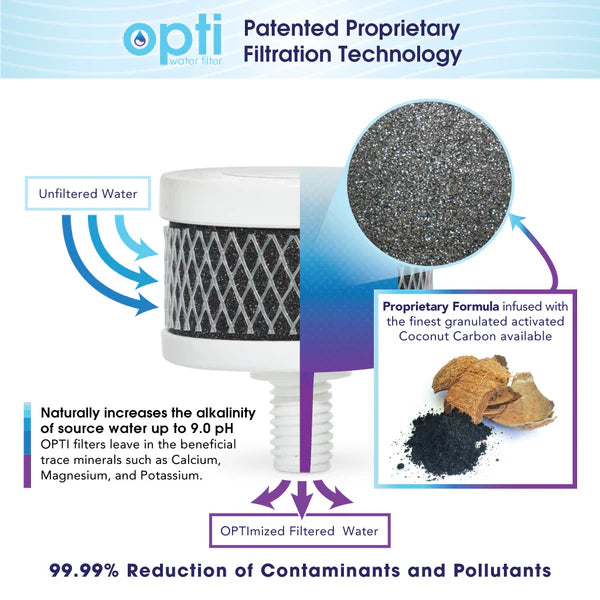How It Works
The high-tech, porous, BPA-free plastic microfilter is infused with both the finest solid activated coconut carbon and Opti Water Filter's exclusive absorbing media that are coordinated carefully for the reduction of potentially harmful contaminants.
Removal of contaminants with carbon is a surface phenomenon known as ABSORPTION, resulting from the molecular attraction of substances to the surface of the carbon. The controlled solid carbon filter contains thousands of interconnected Omni-directional pores that result in a "tortuous path" for superior analytic reduction. This is done by forcing the source water through the filter. While the contaminants and pollutants are removed, our filters leave in the beneficial trace minerals such as calcium, magnesium and potassium.
Opti Water Filter's exclusive Ionic Absorption Micron Filtration coordinates all processes of contaminant reduction by Absorption, chemical bonding, chelation, and depth filtration. Each product is designed to guarantee the greatest amount of reduction per contaminant. By doing this, Opti Water Filter filtering technology beats competing products in percentage of contaminants removed.

FILTER SCIENCE
Opti water filters are infused with the finest solid activated coconut carbon, which aids in the greatest amount of reduction per contaminants in your drinking water, guaranteed by Opti Water Filter. Opti Water Filter™ proprietary blend of adsorption medias naturally enhance the alkalinity of your drinking water, removes harmful contaminants, and protects naturally occurring trace minerals.
Using Opti Water Filter's unique Ionic Adsorption Micron Filter Technology water is passed through micro-porous filters to remove harmful pollutants and contaminants found in tap water. The filter removes up to 99.00% of contaminants including unpleasant taste and odors, Chlorine, DDT, MTBE, Benzene, THM's, Heavy Metals such as Lead, Mercury, Copper, Zinc, Aluminum, leaving pure, high-quality pH water to better hydrate your body.
Water Reports
-

Chloroform
NSF / ANSI standard 53
-

Lead
NSF / ANSI standard 53
-

Chlorine
NSF/ANSI Standard 42
-

PFOS / PFAS
P-473 / Forever Chemicals


